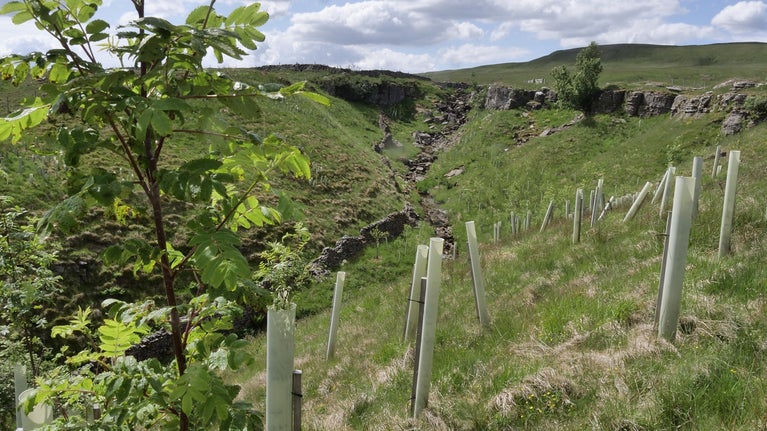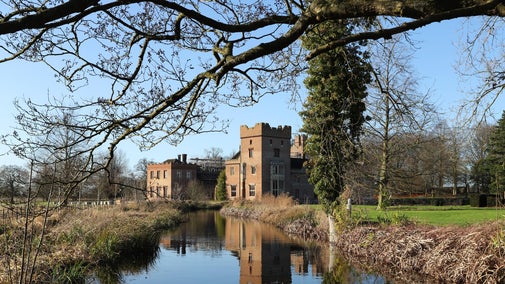
Donate
Everyone needs nature, now more than ever. Donate today and you could help people and nature to thrive at the places we care for.

Our work in the Yorkshire Dales is as much about future generations as it is about caring for its magnificent landscapes today. We recognise the Dales as an important place for agriculture while balancing the need to restore more of the natural environment, and we increasingly consider the impacts of climate change on communities further afield. Discover more about our day-to-day work here, from creating new treescapes to managing sites of special scientific interest.
The National Trust has ambitious targets for tree-planting across the Yorkshire Dales and restoration of peatlands, both of which have significant benefits to nature and help mitigate the impacts of climate change.
Working in partnership with the White Rose Forest – we’ve recently been planting native species mixes of broadleaved trees, shrubs, and orchard trees across 24 hectares at Cow Close, near Buckden, and Low Greenfield, near Yockenthwaite. Further planting is planned for Nab End, near Arncliffe, which will also involve working with volunteers from the local community and neighbours from more urban areas such as Keighley and Bradford.
Elsewhere in the Dales, we’re working with the Yorkshire Peat Partnership at some of the highest ground to restore peatland which helps to ‘slow the flow’ of rainwater. Peat also plays a very important role in the storage of carbon, which would otherwise be released into the atmosphere.

Insects pollinate 80% of plants. We rely on this for the food we eat and the air we breathe. Yet pollinating insects are in trouble, with population crashes being reported in two thirds of our insect pollinator species.
At Hudswell Woods we’ve been working with the charity Buglife to try to reverse this trend, aiming to rejuvenate and link the remaining fragments of grassland that survive and create a network of pollinator-friendly habitat across the UK.
Across the Dales we are working with our tenant farmers to ensure that there is an abundance and diversity of wildflowers and grasses, especially as many pollinators have preferred food plants and their survival may be linked to one or two particular species.
Leaving areas of grassland and scrub undisturbed is also important so that insects can nest and have suitable habitat to overwinter. Scrubby field corners, wide hedgerows and woodland edges are excellent for this as they combine high levels of sunshine with sheltered conditions and are often rich in brambles, ivy and thistle, all of which are beneficial to insects.
Where possible grassland is lightly grazed and if cut it is often managed as a hay crop. In the Dales we have some of the best surviving hay meadows in the UK and on a warm summer’s day these are alive with the sound and movement of pollinators at work.

From time-to-time, you may see our Rangers carrying out targeted tree-felling. This is generally where we have discovered a tree that has been impacted by a disease called ‘ash dieback’.
We don’t always fell diseased trees, but when there is a risk that a dead tree could fall onto a path or a highway, public safety must come first. We continually observe and survey our ash for signs of the disease and are working closely with other organisations, such as the Forestry Commission and Woodland Trust, on the best ways to tackle the disease and manage trees and woodlands infected by it.
Where appropriate, by allowing diseased ash trees to decline and regrow naturally it is hoped dieback-resistant ash trees will regenerate. By allowing nature to take its path the ash trees can continue, for a time, to provide a habitat for the species that depend on them.
We will always ensure that any lost ash trees are replaced through planting (using native species) and natural regeneration, to provide woodland habitat for the thousands of species that rely on it and ensure carbon storage is maintained.
Heart of the Dales is our new landscape recovery project, supported by the Department for Environment, Food, and Rural Affairs [DEFRA], and Natural England. The project will focus on delivering significant gains for habitats and farming in partnership with tenant farmers and landowners across the area – including large areas of the landscapes of Malham Tarn and Upper Wharfedale.
The initial phase will focus on planning how landscape recovery can be delivered within the challenging terrain while delivering for nature, climate resilience and carbon sequestration, with a bespoke approach for each farm. Eventually, Heart of the Dales could see more trees in the landscape, improvements to water quality and associated habitats, alongside other steps to mitigate the effects of climate change and improve biodiversity such as more peatland restoration and species reintroductions.
For more information about our landscape recovery work, please email heartofthedales@nationaltrust.org.uk

Everyone needs nature, now more than ever. Donate today and you could help people and nature to thrive at the places we care for.
Discover the Yorkshire Dales with their rolling countryside, steep-sided valleys, heather-covered moorland and a patchwork of dry stone walls and barns.

The Yorkshire Dales is very dog friendly, and with miles of footpaths to explore, trees to sniff and grass to roll in, your four-legged friend should have a great day.

We believe that nature, beauty and history are for everyone. That’s why we’re supporting wildlife, protecting historic sites and more. Find out about our work.

Read about our strategy, which focuses on restoring nature, ending unequal access and inspiring more people.

Ash dieback is a fungal disease affecting the country’s native ash trees. As many as four out of five ash trees may be affected and, where the dying trees could cause a threat to human safety, we need to remove them.
